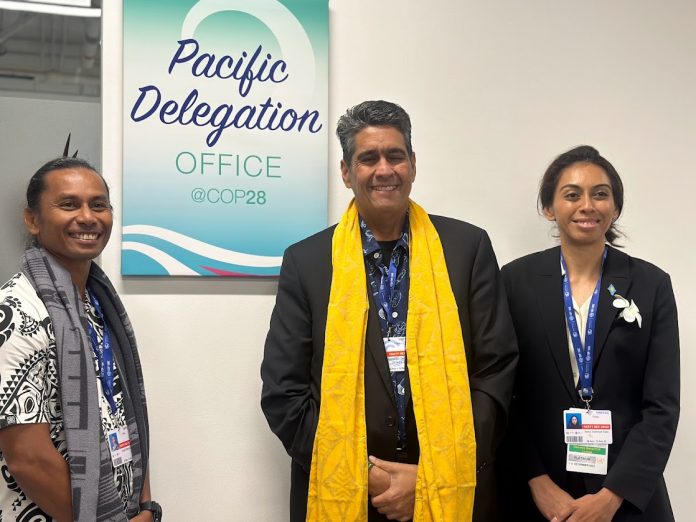By Pita Ligaiula at COP28 in Dubai
Palau’s climate change negotiator and Chair of the Pacific Small Island Developing States (PSIDS) Xavier Matsutaro, Sunday offered a frank assessment of the ongoing COP28 negotiations as the conference approaches its final days in Dubai.
Matsutaro described the current atmosphere as both interesting and busy.
He also highlighted the fluidity of proceedings.
“It’s been an interesting COP; it’s been busy but not at the same time. It’s busy because there is a lot of fluidity in how things are going. There is a whole bunch of meetings coming up, bilaterals, and meetings that are beyond the border of SIDS, and it looks like we are building a good number of coalitions, so that’s what kept us busy.
“In certain instances, we will meet with the COP Presidency and go through the traditional formal process of negotiation,” said Matsutaro at a media briefing in Dubai.
He emphasised the changing nature of the negotiations, involving various meetings and coalitions, both within and beyond the Small Island Developing States (SIDS).
Matsutaro acknowledged the requirement of traditional formal negotiation processes with the COP Presidency and the unique modality of work during this COP.
“At this time of the COP, we are usually really busy working on the text itself, but the modality of the work is different this time around,” Matsutaro explained.
He highlighted the use of small draft working groups led by high-level representatives from respective regions to streamline the negotiation process.
“The idea is that since the body representation from the regions, it’s one way to speed up the process without having too many heads in the tank, which can inherently make things more complex but the trade-offs when few people working on the text might not be robust as it needs to be. So are the pros and cons of the particular process,” Matsutaro explained.
Discussing the Global Stocktake, Matsutaro emphasised its significance as a report card on the implementation of the Paris Agreement.
He explained the focus on key elements essential for humanity, particularly the mechanics to maintain the 1.5-degree goal.
Matsutaro said challenges in maintaining references to 1.5 degrees in the preamble, emphasising its importance in setting the tone for the agreement.
“The preamble is important because it sets the tone for everything else. Anytime you move the 1.5 reference, then it weakens the agreement overall, so we’re also trying to bring that back,” he stressed.
Despite challenges, Matsutaro expressed hope for the negotiations’ positive outcome in the remaining two days.
He highlighted ongoing efforts at the ministerial level, including lobbying with the European Union(EU) and the High Ambition Coalition(HAC).
Matsutaro also acknowledged the ongoing trade-offs but maintained hope for a positive outcome.
“I’m still hopeful, we have two more days. The President is adamant to end it on time, and if it does, for my experience, it will be the first. But I do hope, if it does end on time, that it’s with a decision that is worth the while for everybody in terms of the ambition that is required,” he said.
SOURCE:PACNEWS













